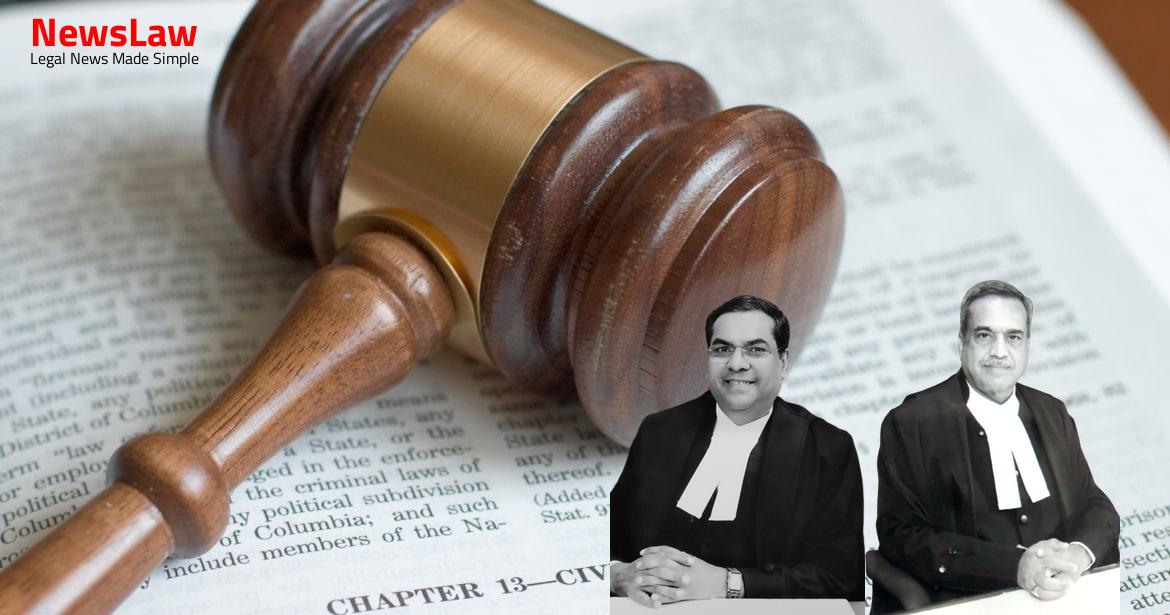In a recent legal case, the Court emphasized the significance of judiciously exercising the power under Section 156(3) of the Cr.P.C. The analysis focused on ensuring fairness and justice in the legal proceedings. The court’s detailed examination provides valuable insights into the proper application of the law when ordering investigations. Follow along to understand the nuanced approach taken by the court in this case.
Facts
- Appellant Nos. 2 and 3 entered into Agreements for Sale with respondent No. 2 for properties in Bangalore.
- The appellants claim to have paid the consideration through bearer cheques which were encashed by respondent No. 2.
- Allegations of respondent No. 2 avoiding registration of Sale-deed after receiving payments.
- Respondent No. 2 filed Private Complaints against appellants for forgery and cheating under IPC sections.
- Multiple FIRs registered against appellants based on these complaints.
- Appellants filed petitions under Section 482 of Cr.P.C. to quash the FIRs.
- High Court dismissed the petitions citing serious allegations of cheating and forgery.
- Appellants also filed suits for specific performance of contract regarding the Agreements for Sale.
- Dispute between parties involves both civil and criminal complaints.
- Appellants challenged the mechanical passing of order under Section 156 (3) of Cr.P.C.
Also Read: Presumption of Genuine Endorsements in Cheque Case
Analysis
- The complaint was not supported by an affidavit, so the Magistrate should not have entertained the application under Section 156(3) of the Cr.P.C.
- The respondent alleged that the appellant took signatures on blank papers and collected cheques as security, fitting into the category mentioned in the State of Haryana v. Bhajan Lal case for no police investigation without a Magistrate’s order.
- The complaint was filed after a significant delay from the institution of suits by the appellants and the filing of a written statement by the respondent.
- The court emphasized the necessity of supporting Section 156(3) CrPC applications with an affidavit to deter false claims and casual invocation of the Magistrate’s authority.
- Applications under Section 156(3) were noted to be filed routinely and without taking responsibility, causing harassment to certain individuals.
- The learned Magistrate failed to consider the law laid down by the court while passing the order under Section 156(3).
- Veracity of affidavits can be verified by the Magistrate, and false affidavits may lead to prosecution as per the law.
- Various cases in different spheres like fiscal, matrimonial, commercial, medical negligence, corruption, and delay/laches in initiating criminal prosecution were being filed, as highlighted in the Lalita Kumari case.
- The power to quash a criminal proceeding should be used sparingly and cautiously, only in rare cases.
- The court should not assess the truth of the allegations in the FIR or complaint.
- The court’s inherent powers cannot be used arbitrarily at the court’s discretion.
- Specific instances where quashing may be appropriate are outlined.
- In this case, the filing of a complaint after civil suits and with a significant delay suggests ulterior motives.
- Section 156 (3) of Cr.P.C. deals with the power to order an investigation.
- The power under Section 156 (3) must be exercised judiciously.
- The case of Priyanka Srivastava and Another v. State of Uttar Pradesh and Others provided guidance on the exercise of this power.
- The court emphasized the importance of judiciously exercising the power under Section 156 (3) to ensure fairness and justice.
- This case highlighted the need for proper application of the law when ordering investigations under Section 156 (3).
- The High Court failed to consider the legal position as per the case of Priyanka Srivastava v. State of U.P.
- The High Court dismissed the petitions based on serious allegations in the complaint.
- Continuation of the present proceedings would be an abuse of the process of law.
Also Read: Medical Negligence and Compensation: A Landmark Decision
Decision
- FIR Nos. 255/2019, 256/2019, 257/2019, and 258/2019 filed in December 2019 are quashed.
- High Court judgments and orders dated 22 January 2021 in Criminal Petition Nos. 6719/2020, 6729/2020, 6733/2020, and 6737/2020 are set aside.
- Pending applications, if any, are disposed of.
Also Read: Remand of Writ Petition for Restoration and Decision on Merits
Case Title: BABU VENKATESH Vs. THE STATE OF KARNATAKA (2022 INSC 209)
Case Number: Crl.A. No.-000252-000252 / 2022



